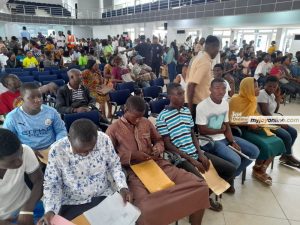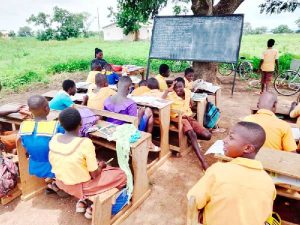THE EDUCATIONAL REVOLUTION: WHO STANDS TO BENEFIT?
[vc_row][vc_column][vc_column_text]Following the implementation of the government Free SHS policy, many other policies on education have sprung up.
Though these policies had come amidst protest and reservations, educational actors had kept mute about them.
The notable among them are the teacher licensing, compulsory NSS for newly trained teachers, the track systems and just recently the government intends to turn colleges into a degree awarding universities.
We want to commend the government for the political will to take education to the next level, notwithstanding, some of these policies had turned out to be unfavourable and rushed through though given time and space could have been implemented to achieve same and better results.
The government in collaboration with NTC agreed with other stakeholders that teachers had to undergo licensing before being posted or employed. Though this did not go down well with many trainees, the licensing exams were written by over 20,000 potential teachers. It, however, turned out that the original plan of having teachers posted after licensing was shot down after the ministry of education urged newly trained teachers to take to National Service.
We found unfolding events to be bizarre in the face of growing want for teachers in the educational front. Although the government claims that financial clearance had been sought to absorb these teachers after their service, no proper documents covering the move had been agreed on by stakeholders.
Besides, compulsory NSS is not an alternative in terms of teacher employment in the country for newly trained teachers. These are professionals who have been bred purposely for the job, and it becomes worrying for government to put them in such an uncertain employment procedure. Ghana is yet to meet the UNESCO teacher to students ratio standard, and this is certainly not good.
The track system of education is yet another policy that seems to lack proper tenet of implementation. Though the government promised of closing the teaching gap with 9000 teachers to mitigate the possible challenges, the move is yet to see fruition. We know only NABCO teachers had been posted and didn’t know exactly when the double track teachers will start their job.
It’s also, however, not clear how the government intend to keep the academic calendar running smoothly in the double track schools. Already, the sports calendar of second cycle schools had been disrupted tremendously knowing very well the role sports play at the SHS level.
We don’t even know exactly how the gold and green tracks will write their end of term exams. The single track is enjoying full and continuous tuition as against ‘tot-tot’ tuition in the double track schools. Teaching hours had been increased, and most schools are closing at 4.00pm. The pressure keeps mounting both on teachers and students every day putting the future of the track systems into uncertainties.
These educational revolutions, I will prefer to call, seem to benefit who or who is benefiting from it?
We found out that, apart from the partial engagement of various stakeholders, in many of these policies, the teacher is never at the centre of any of their implementation.
While a professional teacher with professional training is denied employment directly by GES, the field teachers are asked to work themselves out without corresponding remunerations or incentives.
These are teacher unfriendly policies which seek to posit the teacher as a tool in the hands of a craftsman who doesn’t know the use of it.
With the new track systems, most teachers, especially in the single track schools, will enjoy only one month vacation as against three months two weeks vacation of their other colleagues. This certainly sounds unfair since the government had not put in place any remuneration packages for this excruciating job schedule.
Time won’t permit me to outline the ever ending disadvantages that stare at the faces of desperate teachers in the midst of these revolutionary implementations.
So we ask: Did government actually taught of teaching as a noble profession before the implementation of these policies?
Well, the significant education actors are mute for fear of being tagged as shadow politicians. We have the conviction that the policy ‘implementation era’ might have been activated to achieve a political result rather than bettering the conditions of teachers and improving the standard of education.
The teacher must always be the reason — our profession our job our destiny.
By Isaac Ofori
All Teachers Alliance Ghana (ATAG)
[/vc_column_text][/vc_column][/vc_row]



